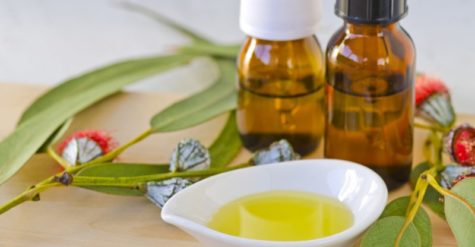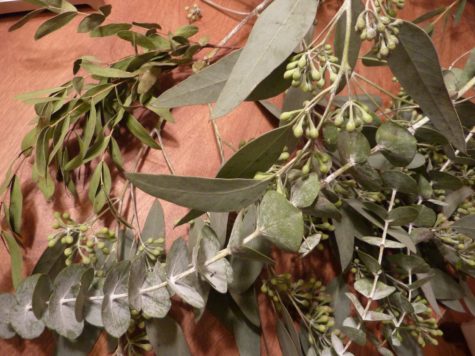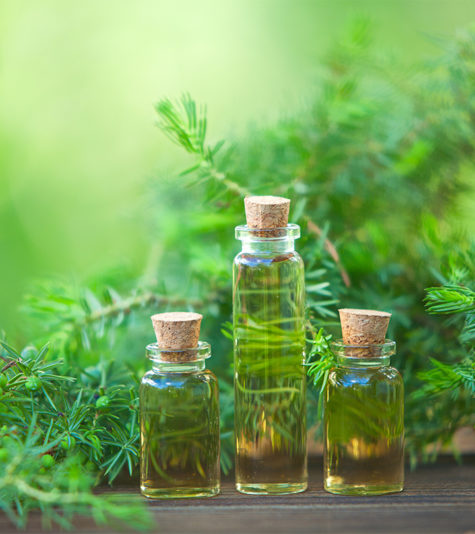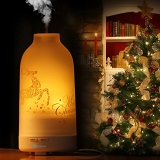Antibacterial
Eucalyptus Essential Oil
Eucalyptus has been distilled from at least 1788 when two doctors, John White and Dennis Cossiden, distilled Eucalyptus piperata for its use in treating chest problems and colic. This was in Australia where the Blue Mountains of New South Wales are so called because of the extraordinary blue haze that exudes from the resin of the eucalyptus gum and envelops the entire landscape. In such a powerfully aromatic environment, the medicinal qualities of this ancient tree would be hard to miss.
There is a wide range of eucalyptus varieties, any one of which would be a useful addition to a Basic Care Kit. Eucalyptus oil is steam-distilled from a number of different variations of the tree Eucalyptus spp. Each of these oils are from one specified chemical race, rather like Zinfadel wine is of one variety but each vineyard produces a Zinfadel of a particular quality and taste.
Generalities:
Eucalyptus is a marvelously versatile and useful oil. It cools the body in summer and protects it in winter. It is antinflammatory, antiseptic, antibiotic, diuretic, analgesic, and deodorizing. Research has proved its antiviral properties as well.
It is best known for its effectiveness against coughs and colds but is equally effective in the treatment of cystitis, candida, diabetes, and sunburn, while also being useful in veterinary care and as an insect repellent.
In general, Eucalyptus oil is used as a specific for the respiratory system. It is an antiseptic stimulant with a very specific balsamic odor that can only be described as smelling like Eucalyptus. This oil has great value in a vaporizer to stimulate and loosen bronchial secretions so that they can be coughed up, and is used primarily for coughs, colds, bronchial infections and asthma. Eucalyptus oil is very effective in killing bacteria and for clearing the system when used in a vaporizer. It is antiviral and cooling.
Eucalyptus citriodora
Also known as Lemon Eucalyptus or Lemon-Scented Gum. Eucalyptus citriodora has been used to perfume linen closets, and as an insect repellent, especially for cockroaches and silverfish.
- Application:
Diffuse or rub on bottom of feet or on location
- Fragrant Influence:
Has a sweet, strong, camphorous, fresh lemony scent. Citronella like. It promotes health, well being, purification, and healing.
- Safety Data:
If pregnant or under a doctor’s care, consult your physician, Do not take internally.
Also used for asthma, athlete’s foot and other fungal infections, respiratory infections, cuts, dandruff, fevers, herpes, infectious skin conditions, laryngitis, scabs, shingles, sore throat, sores and wounds.
Eucalyptus dives
This species has a different, more specific antibacterial action than other eucalyptus oils.
- Application:
Apply topically or diffuse. Avoid direct inhalation.
- Fragrant Influence:
It promotes health, well being, purification, and healing.
- Safety Data:
If pregnant or under a doctor’s care, consult your physician.
Containing low amounts of eucalyptol, Eucalyptus dives is mild and gentle. This variety is ideal for topical application.
Eucalyptus globulus
Also known as Blue-Gum or Tasmanian Blue Gum Eucalyptus. This essential oil usually has the highest 1,8-cineole levels and is heavily cultivated in Portugal, Spain and China.
For centuries Australian Aborigines used the leaves as a disinfectant to cover wounds. Shown by laboratory tests to be a powerful antimicrobial agent, E globulus contains a high percentage of eucalyptol (a key ingredient in many antiseptic mouth rinses). Often used for the respiratory system, eucalyptus has been investigated for its powerful insect repellent effects.
- Application:
Apply topically, diffuse, or use in a humidifier.
- Fragrant Influence:
It promotes health, well being, purification, and healing. A fresh, strong, uplifting scent that is medicinal, herbal and clean. A typical Eucalyptus odor.
- Safety Data:
If pregnant or under a doctor’s care, consult your physician. Do not take internally.
Eucalyptus trees have been planted throughout parts of North Africa to successfully block the spread of malaria. According to Jean Valnet, MD, a solution of 2% eucalyptus oil sprayed in the air will kill 70% of airborne staph bacteria. Some doctors still use solutions of eucalyptus oil in surgical dressings.
This oil may be used for aches and pains, acne, allergies, arthritis, bronchitis, burns, decongestant, respiratory infections, cystitis, endometriosis, increasing energy, gonorrhea, inflammation of the ear, eye, and sinus, malaria, rheumatism, respiratory infections, skin and throat infection or sores, ulcers, vaginitis, and wounds.
Eucalyptus polybractea
Used for acne and cystitis.
- Application:
Diffuse or apply topically, or use in a humidifier
- Fragrant Influence:
It promotes health, well being, purification, and healing.
- Safety Data:
If pregnant or under a doctor’s care, consult your physician. Do not take internally.
Containing 95% Eucalyptol, Eucalyptus polybractea is one of the most potent of the Eucalyptus oils. Eucalyptol is a well known constituent in dental products and insect repellents. Anti-infectious, antiviral, antibacterial, and anti-inflammatory, expectorant, and insect repellent. Has traditionally been used topically to support healthy respiratory function.
Eucalyptus radiata
Also known as Narrow-Leaved Peppermint. This is thought to be the most therapeutic Eucalyptus essential oil. An antimicrobial oil studied for its action against viruses. This oil is used extensively for respiratory infections.
- Application:
Diffuse or rub on bottom of feet or on location, or use in a humidifier.
- Fragrant Influence:
The scent is similar to globulus in that it is medicinal and clean, but also with peppery and camphorous aromas. It promotes health, well being, purification, and healing.
- Safety Data:
If pregnant or under a doctor’s care, consult your physician. Do not take internally.
This oil contains citrol, a constituent known for its cleansing abilities. When combined with bergamot, Eucalyptus radiata has been used effectively on herpes simplex. It may also help with acne, bronchitis, ear inflammation, endometriosis, nasal and sinus congestion, sinusitis, and vaginitis.
Information collected from various sources.
Tea Tree Essential Oil
The Aborigines have been using this indigenous Australian tree in their medications for centuries and today tea tree is the subject of a great deal of international research. Highly regarded as an antimicrobial and antiseptic essential oil. It has high levels of terpinenol, which is the key active constituent.
- Application:
Diffuse or apply topically. Safe for use on children and pets.
- Fragrant Influence:
Promotes cleansing and purity.
- Safety Data:
If pregnant or under a doctor’s care, consult your physician. Repeated use can possibly result in contact sensitization. Tea tree oil should not be ingested in large amounts due to its toxicity and may cause skin irritation if used topically in high concentrations.
Its impressive antiviral, antibacterial, and antifungal properties make it useful in a wide range of conditions. It is used in the treatment of candida and all sorts of infections, for ringworm, sunburn, acne, athlete’s foot, toothache, and pyorrhea, among other things.
Tea Tree oil is steam-distilled from a particular type of Australian tree, Melaleuca alternifolia. Tea Tree oil was introduced it to the Western world via Captain Cook in 1770. This is one oil that most definitely will get lots of use in your medicine chest and should positively be part of the home first-aid kit.
It is used externally on deep wounds, road burns to dislodge dirt and bacteria, cuts, scratches, abrasions, sunburn, insect bites, any sort of pruritis (generalized itching of the sensory nerve endings), burns and scalds, herpes lesions, ringworm, lice and tick bites, eczema and psoriasis, thrush, candidiasis, head and pubic lice, athlete’s foot, fungal infections, treatment of staph sores, boils, pimples, acne, halitosis, stinky feet, sinus congestion, etc…
Very sensitive skin, or skin in sensitive areas may need the oil diluted, but generally this is used “neat.”
The scent is strong, clean, and powerful – maybe too powerful. Even though it cures “hot spots” on pets due to skin disease and fungus, some pets hate the scent and will run the moment the bottle is opened.
Tea Tree oil is 4 to 5 times stronger than household antiseptic. Its bacterial action is increased where blood or pus is present. Externally used on deep wounds and cuts it will remove necrotic tissue and leave a healthy surface.
Tea Tree is a powerful killer of all sorts of bacteria. It is non-caustic to the skin, non-toxic to the body, ti produces no negative side effects, it is a natural solvent (may dissolve some plastics(, it has strong cleaning capabilities, it has a well-balanced pH level, it is mildly anesthetic and very aromatic.
The oil is best applied externally but can be taken internally (with care and in very small amounts). Inhaled, it cleanses the air and purifies the respiratory system and so is useful for disease of the respiratory system.
Collected from various sources






